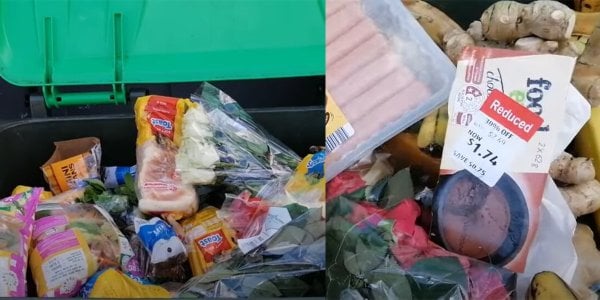Bin there, done that: An Aussie's decades-long affair with dumpster diving
- Replies 8
Despite the prevailing attitude that treats it with disdain, 'dumpster diving' has become an increasingly popular practice.
As consumer society generates colossal amounts of waste, particularly food waste, more and more people are choosing to buck conventional consumerism in favour of this eco-friendly method of fulfilling their needs.
Let’s take a deep dive with one of the pioneers of this practice in Australia.
Simon Eden, a 61-year-old stalwart of the dumpster diving community, claimed that a staggering 80 per cent of his meals come from the contents of bins in South Australia.
Driven by a passion for recycling, and a commitment to diverting ‘as much’ material from landfills as possible, Simon turned dumpster diving into a way of life for decades now.
‘All I buy is my soy milk and bananas once a week,’ he said.

While the thought of eating discarded food might make many cringe, Simon is determined to highlight the sheer scale of food waste that blights not only Australia, but much of the developed world.
This senior citizen is using his experiential knowledge, and digital platforms to bring the distressing reality of waste to thousands of subscribers worldwide.
He films his collection to exhibit ‘show how much food waste’ there is—which, in his own words, is ‘atrocious’.
His social media account demonstrates his regular finds, the absurd volumes of edible food thrown away exercises him most, but also illustrates the sheer diversity and quantity of products—from fresh produce to ready-made meals—that are routinely disposed of.
Simon sources most of his meals from ALDI stores in close proximity to his Adelaide Central Business District residence.
In a video he posted last week, he exclaimed, 'Tonnes of bananas, just tonnes of bananas,’ while showcasing a variety of items, including bread, sausages, pre-made meals, and fresh produce discarded in a skip outside an ALDI store.
According to Simon, supermarkets giant Coles and Woolworths were increasingly out of bounds.
‘I see them standing there on the loading dock, ripping the packaging open, and throwing the contents in,’ he recalled.
During a Senate inquiry regarding supermarket pricing on March 7, it was revealed that a rising number of Australians are resorting to dumpster diving as a response to the escalating cost of living.
Amelia Cromb, of the Grassroots Action Network Tasmania, highlighted the cruel irony of the situation—while food is priced at a premium in supermarkets, vast amounts are discarded even before the ‘best-before’ dates have expired.
‘It just seems like such a cruel mockery almost that people are going to supermarkets to buy food that is a human right... and at the end of the day, the supermarket can just basically rip the tag off that high price, throw it in the bin, as though it had no value at all,’ she argued.
‘It's criminal, there's no other way to put it, it's just unacceptable.’
Ms Cromb informed the committee that sizable amounts of food discarded by supermarkets remained edible—a resource that their community group consistently redirected to individuals facing food insecurity.
Simon's illustrious dumpster diving career has not been limited to food alone.
He's found ‘expensive dinner sets’, ‘electronics’, brand-new ‘board games’, and even ‘two Samsung smart TVs’.
According to him, thrift shops in affluent areas are treasure troves, often hiding expensive unopened items among their rubbish.
However, this unique lifestyle is not without its dangers and contingencies.
Simon had been threatened with police action by upset shop staff on several occasions, and he's even encountered some close encounters of the painful kind.
‘They put these skip bins on the front footpath—I was stupid enough to go there while they were still open—and she came racing out, and she slammed the lid down almost on my fingers,’ he recalled.
Authorities have cautioned about the potential dangers associated with certain types of dumpster diving.
In February, police discovered a man's body trapped in a clothing bin within a Westfield shopping centre car park on the New South Wales Central Coast.
They suspect the individual was engaged in bin surfing, leading to a fatal fall resulting in a broken neck.
Despite dumpster diving's questionable legal status, with it being considered illegal and akin to trespassing across most of Australia, Simon—and others like him—continue their work.
They operate under a number of unwritten rules, including never leaving a mess behind, and even making their scavenging locations cleaner than how they’ve found them.
‘Pick up the rubbish others have left,’ Simon said.
The struggle, however, doesn't end there.
Simon emphasises the importance of dumpster diving during cooler periods of the year to ensure food safety, and recommends visiting dumpsters once shops have closed.
Despite the perceived risk and public's negative attitude towards dumpster diving, it remains a popular activity, with interest burgeoning among those who want to help stem the tide of waste like this Aussie mum.
In 2023, a community leader in Lismore, even provided workshops on safe and efficient dumpster diving, calling the entire practice a 'treasure hunt' that continues to yield shocking finds.
‘I couldn't have imagined the insane amount of perfectly good food that is thrown away,’ he said.
‘It's really shocking and disturbing.’

What are your thoughts on this trend? Do you have some tips on how to minimise your food waste? Let us know in the comments below!
As consumer society generates colossal amounts of waste, particularly food waste, more and more people are choosing to buck conventional consumerism in favour of this eco-friendly method of fulfilling their needs.
Let’s take a deep dive with one of the pioneers of this practice in Australia.
Simon Eden, a 61-year-old stalwart of the dumpster diving community, claimed that a staggering 80 per cent of his meals come from the contents of bins in South Australia.
Driven by a passion for recycling, and a commitment to diverting ‘as much’ material from landfills as possible, Simon turned dumpster diving into a way of life for decades now.
‘All I buy is my soy milk and bananas once a week,’ he said.

Simon showed in a video the amount of food waste he found in a dumpster bin the week prior. Credits: YouTube / DUMPSTER DIVING ADELAIDE
While the thought of eating discarded food might make many cringe, Simon is determined to highlight the sheer scale of food waste that blights not only Australia, but much of the developed world.
This senior citizen is using his experiential knowledge, and digital platforms to bring the distressing reality of waste to thousands of subscribers worldwide.
He films his collection to exhibit ‘show how much food waste’ there is—which, in his own words, is ‘atrocious’.
His social media account demonstrates his regular finds, the absurd volumes of edible food thrown away exercises him most, but also illustrates the sheer diversity and quantity of products—from fresh produce to ready-made meals—that are routinely disposed of.
Simon sources most of his meals from ALDI stores in close proximity to his Adelaide Central Business District residence.
In a video he posted last week, he exclaimed, 'Tonnes of bananas, just tonnes of bananas,’ while showcasing a variety of items, including bread, sausages, pre-made meals, and fresh produce discarded in a skip outside an ALDI store.
According to Simon, supermarkets giant Coles and Woolworths were increasingly out of bounds.
‘I see them standing there on the loading dock, ripping the packaging open, and throwing the contents in,’ he recalled.
During a Senate inquiry regarding supermarket pricing on March 7, it was revealed that a rising number of Australians are resorting to dumpster diving as a response to the escalating cost of living.
Amelia Cromb, of the Grassroots Action Network Tasmania, highlighted the cruel irony of the situation—while food is priced at a premium in supermarkets, vast amounts are discarded even before the ‘best-before’ dates have expired.
‘It just seems like such a cruel mockery almost that people are going to supermarkets to buy food that is a human right... and at the end of the day, the supermarket can just basically rip the tag off that high price, throw it in the bin, as though it had no value at all,’ she argued.
‘It's criminal, there's no other way to put it, it's just unacceptable.’
Ms Cromb informed the committee that sizable amounts of food discarded by supermarkets remained edible—a resource that their community group consistently redirected to individuals facing food insecurity.
Simon's illustrious dumpster diving career has not been limited to food alone.
He's found ‘expensive dinner sets’, ‘electronics’, brand-new ‘board games’, and even ‘two Samsung smart TVs’.
According to him, thrift shops in affluent areas are treasure troves, often hiding expensive unopened items among their rubbish.
However, this unique lifestyle is not without its dangers and contingencies.
Simon had been threatened with police action by upset shop staff on several occasions, and he's even encountered some close encounters of the painful kind.
‘They put these skip bins on the front footpath—I was stupid enough to go there while they were still open—and she came racing out, and she slammed the lid down almost on my fingers,’ he recalled.
Authorities have cautioned about the potential dangers associated with certain types of dumpster diving.
In February, police discovered a man's body trapped in a clothing bin within a Westfield shopping centre car park on the New South Wales Central Coast.
They suspect the individual was engaged in bin surfing, leading to a fatal fall resulting in a broken neck.
Despite dumpster diving's questionable legal status, with it being considered illegal and akin to trespassing across most of Australia, Simon—and others like him—continue their work.
They operate under a number of unwritten rules, including never leaving a mess behind, and even making their scavenging locations cleaner than how they’ve found them.
‘Pick up the rubbish others have left,’ Simon said.
The struggle, however, doesn't end there.
Simon emphasises the importance of dumpster diving during cooler periods of the year to ensure food safety, and recommends visiting dumpsters once shops have closed.
Despite the perceived risk and public's negative attitude towards dumpster diving, it remains a popular activity, with interest burgeoning among those who want to help stem the tide of waste like this Aussie mum.
In 2023, a community leader in Lismore, even provided workshops on safe and efficient dumpster diving, calling the entire practice a 'treasure hunt' that continues to yield shocking finds.
‘I couldn't have imagined the insane amount of perfectly good food that is thrown away,’ he said.
‘It's really shocking and disturbing.’
Key Takeaways
- Simon Eden, a veteran dumpster diver, finds '80 per cent' of his food from bins, highlighting the significant food waste issue in Australia.
- A Senate inquiry into supermarket pricing heard testimony about the increased trend of Australians turning to dumpster diving due to rising living costs.
- Despite the potential legal and safety risks, many Australians were interested in dumpster diving to offset the cost of groceries.
- Community leaders were hosting workshops to teach individuals how to safely engage in dumpster diving, emphasising the abundance of usable food being discarded by retailers.
Last edited:







